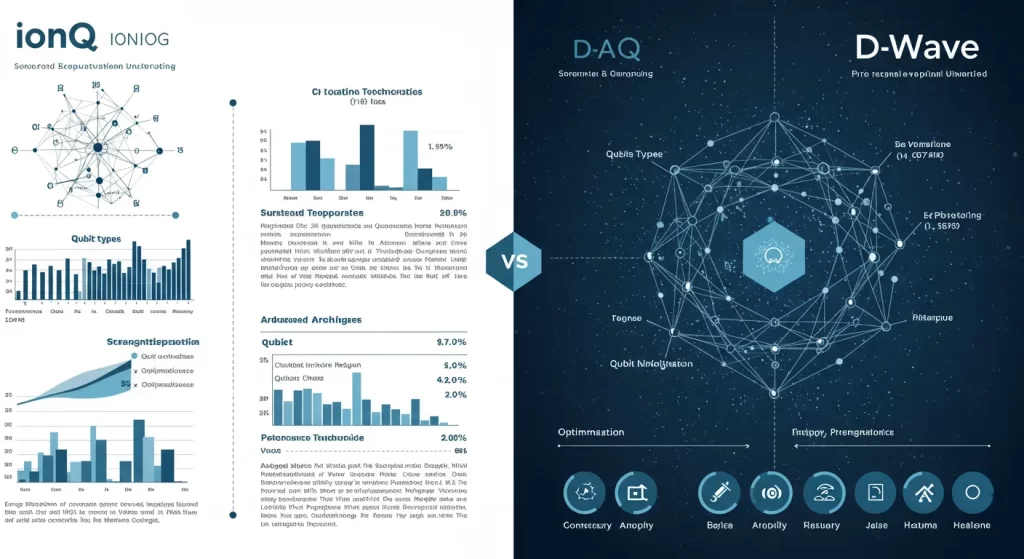Table of Contents
Quantum computing is in the field of practical applications from theoretical research, attracting significant investment interest. The region has two leading players, Ionak and D-Wave Quantum Ink.
Both companies provide different approaches to quantum computing, making them complicated options for investors. This article focuses on the comparative analysis of the ionic and D-Wave, as well as their technologies, financial performance, and market status.
Technological Foundations
IonQ: Trapped Ion Quantum Computing
IONQ specializes in stranded ion quantum computing, which uses separate ions as qubits in electromagnetic fields. This approach is known for its high-loyal operations and scalability.
The IONQ system is designed for general purposes and aims to solve a wide range of complex problems. The company has made significant progress in developing hardware and software solutions that are integrated with major cloud platforms such as Amazon web services, Microsoft Azure, and Google Cloud.
D-Wave: Quantum Annealing

D-wave appoints quantum annealing, which is a special technique for adaptation problems. While there is not a universal quantum computing method, quantum anneal is effective for specific applications such as logistics, financial modeling and machine learning.
The system of the D-Wave, including the Advantage 2 platform, has been used by organizations such as Lockheed Martin and Deloite for real-world problem-solution.
Financial Performance and Market Position
IonQ
IONQ has demonstrated a commitment to development through strategic acquisition, including $ 1.075 billion in the recent purchase of Oxford Ionics. The move aims to increase IONQ’s capabilities and expand its market access.
In the first quarter of 2025, IonQ reported a revenue of $ 7.6 million, with estimates to double its revenue for the year. The company is also contacting profitability, reducing its loss and making itself a position for future financial stability.
Also Read: The Significance of IP Address 158.63.258.200 in The Digital World
D-Wave
D-Wave reported an increase in revenue by 509% in the first quarter of 2025, a total of $ 15 million. This growth is attributed to increasing its quantum anneal system.
The company abolished the quarter with more than $ 300 million cash, providing a solid financial foundation to support its operations and expansion efforts. Investment Considerations
Valuation Metrics

When comparing the valuation metrics, the price-from-sell (P/s) ratio of the IONQ is at 212.84, while D-Wave is slightly higher at 240.66.
These figures indicate that both companies are given importance on a premium, which shows investor optimism about the future of quantum computing.
However, it is important to consider these ratio in terms of development prospects and technological progress of each company.
Also Read: 127.0.0.1:62893: A Localhost Address for Testing and Development
Market Sentiment
Recent developments in the quantum computing sector have positively affected the market spirit. For example, the comments by NVIDIA CEO Jensen Huang at the GTC Paris conference highlighted the “conflict point” of quantum computing to reach close to the “divine point,” leading to an increase in investor trust in the industry.
Both IONQ and D-WOVE experienced stock value growth after these comments, outlining the growing interest of the market in quantum technologies.
Closing Words
Ionac and D-Waves represent two different approaches to quantum computing, each with its strength and ability. The general-purpose quantum computing platform of the IONQ provides versatility and scalability, appealing to a wide range of applications.
D-Wave’s attention to quantum anneal provides special solutions for adaptation problems, catering to specific industry needs. Investors should consider their investment goals, risk tolerance, and interest in general-purpose or special quantum computing when evaluating these companies.
Common FAQs
What is the primary difference between IonQ and D-Wave?
IonQ utilizes trapped ion technology for general-purpose quantum computing, while D-Wave employs quantum annealing for specialized optimization tasks.
2. Which company is closer to profitability?
IonQ is approaching profitability, with narrowed losses and revenue growth projections. D-Wave has achieved significant revenue growth and maintains a strong cash position.
How do their valuation metrics compare?
IonQ has a P/S ratio of 212.84, and D-Wave’s is 240.66, indicating high valuations for both companies in the quantum computing sector.
What recent developments have impacted their stock prices?
Positive industry developments, such as Nvidia’s optimistic outlook on quantum computing, have led to increased investor confidence and stock price gains for both companies.
Which company offers a more versatile quantum computing solution?
IonQ’s general-purpose quantum computing platform offers broader application potential, while D-Wave’s quantum annealing systems are tailored for specific optimization problems.

